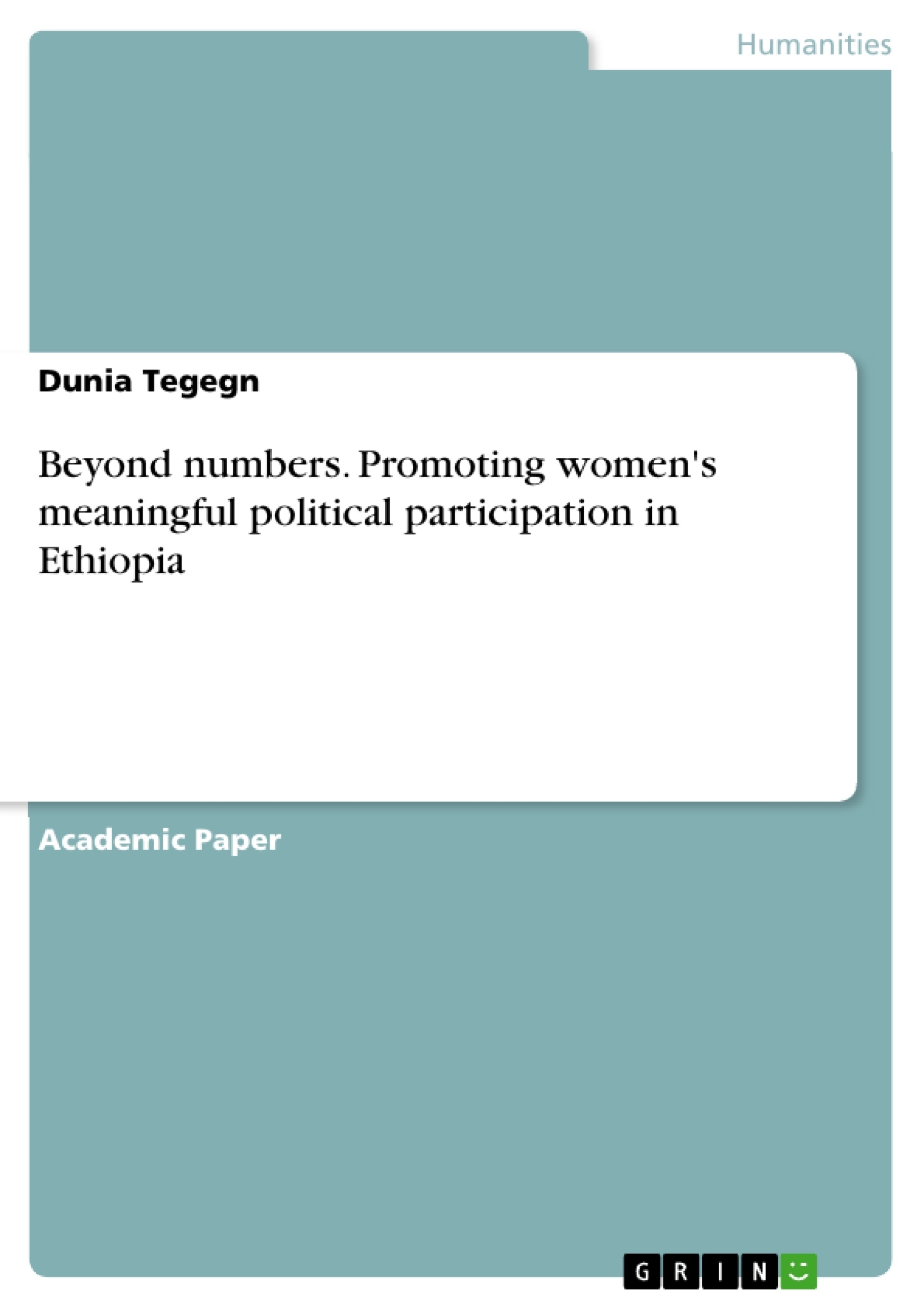Although there is a growing representation of women in political decision-making positions in Ethiopia, the achievement of equality between men and women can be accelerated through translating the increasing levels of representation into meaningful participation.
Inhaltsverzeichnis (Table of Contents)
- Over view of the problem.
- Religious Dogma and Culture
- Economic Factors.
- Reproductive Burden and Time Constraint
- International, Regional and National Legal Frameworks on Meaningful Political Participation
- International Legal Frameworks
- Regional Legal Frameworks
- National Legal Frameworks.
- Why Aaddress Meaningful Participation in Politics in Ethiopia: the Role in the US Foreign Policy on Gender....
- Enhancing Women's Political Participation not only a Rght Thing to Do but a Smart Thing to Do..............
- United States National Security Strategy
- The 2010 Quadrennial Diplomacy and Development Review (QDDR).
- USAID's Revised Policy on Gender Equality and Female Empowerment.
- United States National Action Plan on Women, Peace and Security
- The US Women in Public Service Project Announcement
- Mechanisms/Tools in US Disposal Towards Accelerating Women's Political Participation ........
- Multi Lateral Tool: Using the Fifth Sustainable Development Goal on Ensuring Full and Effective Participation and Equal Opportunities for Leadership in Politics..
- Bilateral Tools
- USAID Country Development Program for Ethiopia
- The US Human Rights Reports on Ethiopia as a Bilateral Tool
- Foreign Assistance Programs through Capacity Building Training to Women in Decision-Making..
- Engaging the Ethiopian Government on Quota Implementation and Diplomacy
Zielsetzung und Themenschwerpunkte (Objectives and Key Themes)
This thesis examines the challenges to women's meaningful political participation in Ethiopia, despite their growing representation in political decision-making positions. It aims to highlight the need to translate increased representation into meaningful participation, which can be accelerated through various tools and mechanisms available to the US. The work analyzes the factors hindering women's political participation, explores the role of US foreign policy in promoting gender equality, and proposes specific tools and strategies to enhance women's political involvement in Ethiopia.
- The obstacles to women's meaningful political participation in Ethiopia, including cultural norms, economic factors, and time constraints.
- The importance of translating increased women's representation into meaningful participation.
- The role of US foreign policy in promoting gender equality and women's political participation in Ethiopia.
- An analysis of various tools and mechanisms available to the US to accelerate women's political participation in Ethiopia.
- Recommendations for effective strategies to address the challenges and promote meaningful participation for women in Ethiopian politics.
Zusammenfassung der Kapitel (Chapter Summaries)
The first chapter explores the multifaceted problem of women's low political participation in Ethiopia. It examines the impact of religious dogma and cultural norms, economic constraints, and the burden of reproductive responsibilities. The chapter also analyzes the relevant international, regional, and national legal frameworks that aim to promote meaningful political participation.
The second chapter delves into the importance of addressing meaningful participation in politics in Ethiopia, specifically within the context of US foreign policy on gender. It examines how promoting women's political participation is both a moral and strategic imperative. The chapter reviews US national security strategies, the Quadrennial Diplomacy and Development Review, USAID's gender equality policies, and US initiatives related to women, peace, and security, highlighting their relevance to the issue of women's political participation in Ethiopia.
The third chapter focuses on the mechanisms and tools at the US's disposal to accelerate women's political participation in Ethiopia. It examines both multilateral and bilateral approaches, including the use of the Fifth Sustainable Development Goal, USAID country programs, human rights reports, foreign assistance programs, and diplomatic engagement. The chapter emphasizes the need for capacity building and training to empower women in decision-making roles.
Schlüsselwörter (Keywords)
This thesis explores key themes surrounding women's political participation in Ethiopia, including gender equality, meaningful participation, representation, US foreign policy, women's empowerment, capacity building, economic factors, religious dogmas, cultural norms, and legal frameworks.
Frequently Asked Questions
What are the barriers to women's political participation in Ethiopia?
Barriers include deeply rooted cultural and religious dogmas, economic constraints, and the "reproductive burden," where time constraints due to domestic duties limit women's ability to engage in politics.
What is the difference between representation and meaningful participation?
Representation refers to the number of women in office (often driven by quotas), while meaningful participation refers to women's actual influence, leadership opportunities, and ability to shape policy decisions.
How does US foreign policy promote gender equality in Ethiopia?
The US uses tools like USAID programs, human rights reports, and diplomatic engagement to encourage the Ethiopian government to implement quotas and support capacity-building for women leaders.
Is promoting women's participation a matter of national security?
According to US strategy documents like the QDDR, enhancing women's political participation is not only "the right thing to do" but also a "smart thing to do" for global stability and security.
What role do international legal frameworks play?
International and regional frameworks provide the legal basis and pressure for Ethiopia to align its national laws with global standards for gender equality and leadership opportunities.
- Citation du texte
- Dunia Tegegn (Auteur), 2016, Beyond numbers. Promoting women's meaningful political participation in Ethiopia, Munich, GRIN Verlag, https://www.grin.com/document/424428



